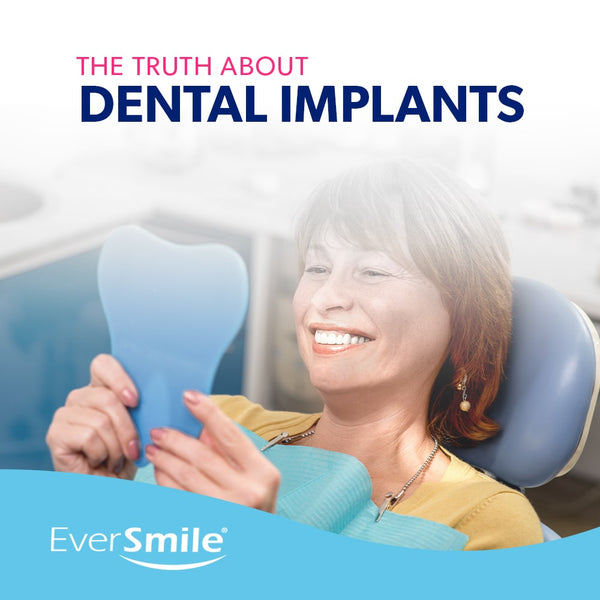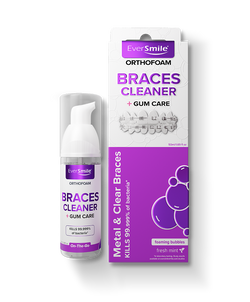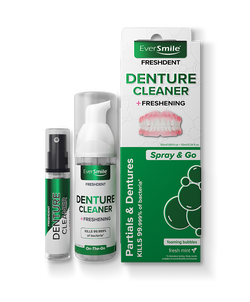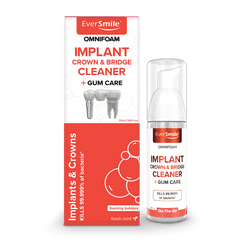
The Truth About Dental Implants
Missing or damaged teeth can cause a multitude of problems, but thanks to dental technology, tooth replacement options are better than ever. Dental implants are one of these options and can offer a lifetime of satisfaction. Let's take a look at the truth about dental implants to help you decide if this is the best choice for you.
What Are Dental Implants?
A dental implant is an artificial tooth used to replicate the function, look and feel of a real tooth. They are made up of three pieces:
- The post: A titanium screw-like cylinder that's embedded in the jawbone
- The abutment: A post extension that connects the crown to the post
- The crown: The artificial tooth replacement
Who Qualifies for Dental Implants?
People with missing, broken or decaying teeth often need tooth replacement options. Whether you suffered an injury or deal with hypodontia, dental implants can solve the problem of any gaps in your smile. Candidates for this procedure typically have several of the following qualifications:
- Fully matured jaw bone
- Adequate bone density and regeneration
- Healthy gums
- Problems with dentures
- Desire to improve your looks, chewing or speech
- No tobacco habits (smoking or chewing)
- Patience
Advancements in dental technology have opened opportunities for those who can't meet these criteria, even those with poor bone density. Proper hygiene is important for those seeking dental implants, and they should be diligent in this practice to prepare themselves for the surgery and for the long-term maintenance of their replacements.
What is the Procedure For Dental Implants?
The dental implant procedure consists of multiple steps and can involve multiple specialists. This usually depends on your current oral health and your bone and structural conditions. For more complicated cases, you need input from more than one professional. Your dental team could consist of an oral surgeon, periodontist, prosthodontist or even an ears, nose and throat (ENT) specialist. Despite this, a dental implant surgery isn't as complicated as it sounds and is pretty standard practice. Here is what you can expect from the process.
Evaluation
The first thing you'll need to do is assess whether an implant is right for you. You can expect your dentist and their team to take X-rays, impressions and other types of imaging to evaluate your eligibility. Your dentist will also go over your medical history, including preexisting conditions, your prescription and over-the-counter medications. If you both agree that a dental implant is right for you, your dentist will create a surgical plan to ensure the implant site is prepared and that the fit and positioning of your replacement tooth will be seamless and natural.
Necessary Extractions or Grafting
Sometimes, candidates for implants will need tooth extractions and bone grafts to prepare them for an implant. A tooth extraction will involve a visit to a qualified dentist or oral surgeon who will safely remove the broken or damaged teeth you're aiming to replace.
Additionally, if your bone structure isn't adequate enough to support a post, you'll need a follow-up grafting surgery. Both natural bone, taken from your own body, or synthetic material is available for building up the jaw structure and your doctor can help you decide which works best for you. A bone graft can take time to heal and grow strong enough to support a dental implant, so patience and proper at-home care are crucial.
Post-Placement and Healing
Once the site is ready for your implant, the next step is embedding a post in the jaw bone. This is done by numbing the local tissue and creating an incision in the gums to expose the bone. The surgeon will then drill deep enough into the jaw to mimic a tooth root and place your new titanium post. Once embedded, the post will need a few months to heal as your natural jaw bone fuses with the titanium to create a secure foundation for your implant. If you're concerned about the appearance of a gap, talk to your dentist about a partial, temporary denture.
Sometimes, the abutment, or the piece that connects with the crown, is attached to the post during this procedure. Since it juts out the gums, it's visible when you talk or smile, which causes some people to opt for additional surgery later on.
Abutment Placement
If you opted out of adding the abutment in the original procedure, you will need to have it done once your bone growth secures the post. After using local anesthesia, an incision is made to expose the post. Once attached, the surgeon will close the gums around the abutment but not cover it completely. Your gums will need two weeks to heal before the replacement tooth can be attached.
Crown Placement
After two weeks, your dentist will take impressions of your teeth, which will help them mold a matching crown, or artificial tooth. Once it's prepared, your dentist will permanently cement or screw the crown into place. Once this is installed, it cannot be removed. There are removable options available, which would allow you to remove, clean or even replace them as needed.
Recovery
Though implant surgery sounds intense or even scary, inserting dental implants are typically more simple and less painful than extractions. The success rate of dental implants is 95-98 % success rate, which makes them a great option for those that need them! But as with any surgery, you may experience discomfort after your operations. Normal side effects include:
- Swelling
- Bruising
- Minor bleeding
- Pain around the surgical site
What Are the Benefits of Dental Implants?
Healthy teeth contribute to a healthy body, and each tooth serves an important purpose. Missing one or more teeth can cause problems such as discomfort, premature aging, bone loss and gum disease. Tooth implant surgery helps solve these problems with a myriad of benefits. Let's break down the advantages of dental implants.
Provides Natural Look and Feel
One of the best benefits of dental implants is that it restores the original structure of your bite and reestablishes your full chewing potential. Because they're permanent, you can resume your usual activities, such as eating, talking, brushing and flossing with renewed comfort. It's also a confidence booster since you won't be able to tell the difference between your implant and a real tooth! Your smile will seem as natural as ever!
Supports Adjacent Teeth
Teeth are like good friends; they support each other. So when one or more go missing, the teeth left behind lose their stability and start to drift. With that newfound space, they shift in the gap, affecting your bite, chewing ability and appearance. Over time, this can make tooth replacement more difficult and even cause tension in your temporomandibular joint or TMJ. An implant stands in the gap and supports the adjacent teeth to prevent these problems.
Promotes Bone Health
A root does more than just anchor a tooth in place. Roots stimulate the jaw as we chew and bite, which is crucial for bone health. Without stimulation, the bone begins to resorb and deteriorate. People can lose 25 percent of their bone density if a tooth is not replaced within a year of its loss. The titanium post in an implant serves as the natural root's replacement and promotes lifelong bone health!
Wards Off Gum Disease
Missing teeth expose the gums, leaving pockets and crevices that can harbor fugitive food and bacteria. This can lead to gum inflammation and infection, which can damage your jaw bone and impact your other teeth. Left untreated, gum diseases can devolve into a whole mess of other problems when that bacteria sneaks into your bloodstream, resulting in heart attacks, strokes and even Alzheimer's disease. Taking care of your gums is not just about oral health; it impacts your whole body!
Prevents Premature Aging
Bone loss due to missing teeth or gum disease can contribute to premature aging. Without adequate bone support, facial skin begins to sag around the jawline and slowly collapses the gap between the nose and lower jaw, resulting in unwanted mouth wrinkles, a protruding chin and thin lips. Bone loss also impacts chewing, which can affect a well-balanced diet. Poor nutrition also contributes to premature aging, turning implants into the next best thing to the fountain of youth!
What Are the Risks of Dental Implants?
With any surgery, there are potential risks involved. Choosing a trusted dental team is the best way to avoid these risks, but it's important to understand them. Though these occurrences are rare and relatively simple to treat, here are the downsides of dental implants:
- Infection: Since implanting a titanium root requires an incision, there is a risk of infection. Sometimes bacteria can get into the implant site, which complicates recovery. A good way to reduce your risk of infection is to follow your dentist's at-home care instructions!
- Local damage: If the surgery isn't performed properly, it is possible to suffer damage to local blood vessels, teeth and jawbone. By choosing an accredited and experienced dentist, you can prevent these kinds of complications!
- Nerve damage: Sometimes, surgery can cause pain, numbness, sensitivity or tingling.
- Sinus problems: If an implant is placed in the upper jaw, an underqualified surgeon could cause it to protrude into the sinus cavity.
There are also other non-medical considerations to look at when considering dental implants. The surgery can be costly and most insurance plans don't cover it. Despite this, your health is a worthwhile investment and in many ways, the benefits far outweigh the cost of one procedure, as opposed to the financial burden of future medical expenses caused from the complications of missing teeth.
What is Peri-Implantitis?
When bacteria builds up in the hard and soft gum tissue around an implant, it can lead to peri-implant disease. This condition has two classifications: peri-implant mucositis and peri-implantitis. In most cases, peri-implant mucositis precedes peri-implantitis and causes inflammation around the soft gum tissue. If undiscovered or left untreated, this can lead to peri-implantitis, which is when the inflammation begins to deteriorate the bone. This destabilizes the implant's support, thus damaging the implant and rendering it ineffective.
Symptoms and Risk Factors
The symptoms of peri-implantitis are similar to gingivitis, so look for bleeding or swelling around your gums after you brush or floss your teeth. A loose implant is another red flag that should prompt you to see your dentist, as is pain not associated with your surgery recovery. Some people are more susceptible to contracting peri-implantitis disease than others. Here are a few of the risk factors:
- Diabetes or arthritis
- Periodontitis
- Bone grafting
- Alcohol and nicotine consumption
- Occlusal overloading or too much force on the implant
When discussing peri-implantitis with your dentist, be sure to share as much information as possible about your pre-existing conditions or risk factors. This can help them establish a treatment plan to help reverse the condition.
Peri-Implantitis Prevention
The good news is you can prevent peri-implantitis. Despite unavoidable risk factors, such as genetics or necessary bone grafting, practicing proper oral hygiene and utilizing specialized cleaning products are simple and effective strategies for nipping peri-implant disease before it starts. Proper implant care is simple but crucial to protecting your gums and teeth from disease!
How do I Take Care of My Dental Implants?
In addition to preventing peri-implantitis, caring for your dental implants will help them last a lifetime! Fortunately, proper maintenance is as simple as forming some good habits and using the right products. Here are three easy steps to care for your dental implants
Practice Good Dental Hygiene
Practicing good oral hygiene isn't just good for your natural teeth. They're good for your implants as well. Remember to brush and floss daily, more than once if possible. Also, use a soft-bristle brush since it's gentler on your mouth, and choose low-abrasive toothpaste designed for sensitive teeth as opposed to high-abrasive whitening pastes. Regular visits to your dentist for cleaning and evaluation should also be part of your routine. Aim to schedule appointments every six months, unless your dentist recommends more frequent visits.
Quit Smoking and Other Bad Habits
Tobacco is not just terrible for your teeth but for your health in general. It weakens your immune system leaving your mouth more vulnerable to harmful bacteria that can cause any number of oral health problems. Quitting smoking and chewing is a great way to care for your implants and your body as a whole. Treating other bad habits, such as chewing ice, grinding your teeth and drinking excess sugar or caffeine, can also increase your implant's lifespan!
Use OmniFoam Implant Cleaner
Plaque and bacteria can build up on your implant's surfaces, so cleaning them is important for preventing peri-implantitis. Getting to the grooves and crevices around your implant can be tricky, which is why adding OmniFoam to your routine is vital for implant protection and care! OmniFoam is a dental implant cleaner that effectively removes biofilm, fights peri-implantitis and kills 99 percent of bacteria in the span of one minute. You can use it while brushing, as a rinse or with trays. You cant take it on the go, making it a simple solution for a lifetime of results!
Learn more about how OmniFoam cleans and protects your implants, and place your order today to make it a part of your hygiene routine!







Post a Comment!